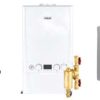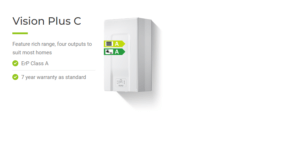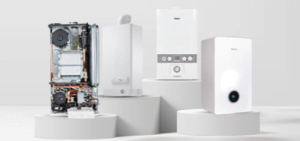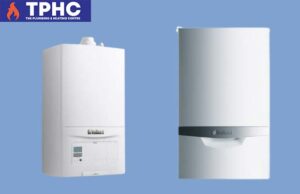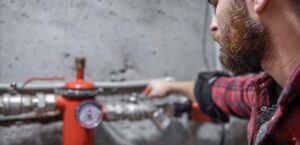Do you want to know the best types of boilers or which boiler is best for your home? Many things need to be clarified, including boiler type (conventional and combi), the type of heating system (oil, gas, electric, or LPG), or listening to your needs.
Purchasing a new boiler is one of the most significant transactions in your life; the unit has to be an excellent investment in an energy-effective way that brings down the heating bill.
The article will help you understand the options, making it easier to choose which boiler is the best for your home, whether it is your main house, holiday home, or even a rental property.
Three main types of boilers
The existing central heating system has three main best types of boiler, and your needs determine their suitability
Combi boilers
The combi boilers are like tiny little boxes that can fit nicely in one kitchen cupboard. They have become quite popular in small apartments and houses in the UK because there are no additional parts. This boiler combines a hot water storage tank and heats water when needed. In fact, it gives hot water and heating both.
Advantages
- The properties of the combi boiler are the most affordable cost and good efficiency. Moreover, they can be installed easily.
- Combi boilers, however, are known for providing hot water and central heating, which is why they are termed combi boilers.
- They’re the best for apartments and tiny houses when you need a small amount of hot water.
Disadvantages
A drawback of the boiler in compile is that it doesn’t cover multiple widths of bathrooms and kitchens. It doesn’t function well with water pressure, therefore you can only use a tap at a time not running the sink while the washing machine is on. Plus, this boiler doesn’t have backup tanks, and they have not adjusted easily with solar energy systems.”
System boiler
System boilers are like conventional boilers, but they don’t need a tank for storing cold water. They have two main parts: a boiler that is tightly closed by a cylinder.
Advantages
- The warm-water system is faster and less tricky to install.
- You don’t need an additional cold water tank for this system. They perform like a charm in areas with low water pressure, too.
- They are able to cater to intense hot water demands, such as in homes with multiple bathrooms.
Disadvantages
In contrast, although a system boiler has two parts, the floor space in your home needs both the boiler and the water cylinder. In addition, the insulation quality for your house’s system boiler may also play a part if it affects how efficiently the system operates, which you might end up paying for in your heating bills. Also, the size of the hot water cylinder decides how much hot water you can get instantly.
Conventional boilers
A type of boiler that’s known as traditional or conventional is another name used for a boiler. It is the oldest type of boiler. It uses a hot water storage cylinder and a domestic cold water tank. This heating and storage system still involves greenhouse gas emissions, which makes it only partially environmentally friendly.
Advantages
- It is ideal if you need hot water in more than one room.
- Also ideal for an area with poor water pressure.
- You also have a chance to select various sizes of hot water tanks to meet your requirements.
- Additionally, it could be your option if you care about efficiency and would also like to utilize solar power
Disadvantages
The one drawback is that the conventional boiler takes time to heat up, which doesn’t allow for the sudden instant you get with a combi boiler. It also requires the most significant amount of space for installation, as it needs separate tanks for hot and cold water. This makes installation costs higher.
Different Types Of Boilers
A usual boiler was burning a gas. However, modern options and this specific boiler type have different fuel choices, such as ecological or less market-dependent. These further boiler’s functions are guaranteed with the mentioned fuel.
Condensing boilers
Condensing boilers are constructed to save energy, and all of the heat that was lost before is now captured and reused. They are efficiency-centered, and as much as possible, only heat is put back into your house to prevent its escape.
Benefits of using them
The condensing boiler is the most environmentally friendly process with less greenhouse gas emission. Efficiency is crucial as they take advantage of your house’s warmth to minimize the need to produce new heat.
Oil boilers
Oil boilers are included in the heating system if a house still does not need to be connected to the main gas line. They use more oil than gas for warm air and water heating instead.
Benefits of using them
This kind of boiler is particularly suitable in areas with low-density populations where there is no electricity coverage.
They stand alone and are self-contained, ensuring they can be installed indoors or outdoors without being affected by climate, insulation, or the surrounding structure.
Electric boilers
An electric boiler is functionally the same as a gas-powered boiler; only the electric one is operated by electricity instead of gas.
Benefits of using them
The central electric boilers are considered the most environmentally friendly among those concerned about our planet. They operate silently, are close to 100% efficient, have fewer parts that can break down, can be installed anywhere in the home with a bit of space, and have no possibility of carbon monoxide leaks or emissions.
Gas boilers
A domestic gas boiler, like a furnace, uses gas to produce hot water circulated in the home. There are a variety of gas boilers, but they operate the same.
Benefits of using them
Gas boilers are commonly the first option for quality and affordability. The gas is the most contemporary and readily available fuel. They are efficient for use in big and small places, whether in old or new buildings.
LPG boilers
A gas boiler is mainly dependent on the same technology as it does if it runs on oil or gas. They are becoming more efficient as the technology for manufacturing them is getting smaller.
Benefits of using them
LPG-fired heaters are an ideal choice if the spaces are not significant and for those who care about the environment. Conversely, LPG is usually less expensive because it costs less than fuel oil and gas.
Considering factors for buying the best boiler type
Boiler purchase is something that one should take time into;
Consider several factors when you look for the best heating system to buy for your home and which one best suits your needs.
Here’s a checklist to get started
- How will oil, gas, LPG, and electricity bills rise against your heating bills?
- Do you care how you contribute to climate change?
- How much hot water does the home require? How many bathrooms should get hot water?
- Have you always wished you had hot water whenever you want it?
- Is your house’s water pressure stable?
- Is your house insulation good enough?
- What are your installation and maintenance budgets?
Answering these queries makes it easier for people to choose the best boiler to buy as they set their minds between a gas combi boiler and a conventional oil boiler, for instance.
Final review
Modern boilers feature several pros that depend on one’s needs. Although directly replacing an existing boiler is a significant financial commitment for homeowners, making an informed decision by learning about alternatives will make it wise.



